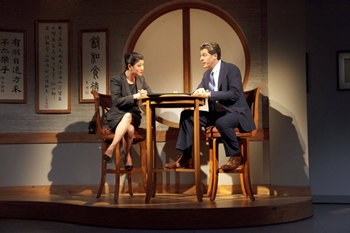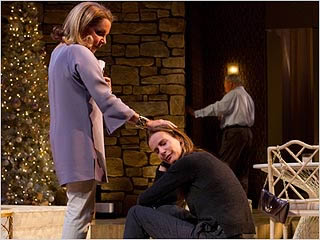HotReview.org Editor's
Picks
Shows Worth Seeing:

Chinglish
By David Henry Hwang
Longacre Theatre
220 W. 48th St.
Box office: (212) 239-6200
To judge from Chinglish’s
reviews, the best thing about it is the parade of translation-bloopers
it contains: one after another botched public sign and conversational
howler whose bizarre Chinese-English misunderstandings form the
meat of a fresh, if facile, comedy. The gaffes are indeed amusing:
“Financial Affairs is Everywhere Long” (“Chief
Financial Officer”); “Deformed Man’s Toilet”
(“Handicapped Restrooms”); “Cleveland isn’t
exactly a farming [village]—though I suppose it was at one
time” (“He says their crops failed long ago”).
One problem with focusing on such obvious ineptitude is that it’s
a tad condescending. We would never be so careless, of
course . . . Another problem, though, is that the play’s
ambitions run deeper than easy yucks. Chinglish is a
muscular, clever and thought-provoking new work that shares major
themes with M. Butterly.
The story is told in flashback by Daniel,
a Cleveland sign manufacturer (played with dead-on Rotarian geniality--and
anxiety--by Gary Wilmes) explaining to an American commerce league
how he managed to get a business foothold in China. We see him
arrive in the town of Guiyang three years earlier and work through
a British consultant to establish “guanxi,”
or relationships, that could help him sell signs. Long story short:
the one relationship he establishes is with the town’s pretty
Vice Minister for Culture, Xi Yan (played with powerful acuity
by Jennifer Lim), with whom he has an affair. Misunderstandings
accrue, and it gradually becomes apparent that Hwang’s real
quarry is the question of whether the cultures Daniel and Xi represent
have a prayer of understanding one another more than superficially
under current circumstances.
Daniel, a seemingly plainspoken, midwestern
straight-shooter, turns out to be anything but. And Xi, an ambitious
professional we presume is using Daniel to climb her institutional
ladder, proves to be a strangely loyal wife. Everyone wants to
be seen as honest but no one can be taken at face value. Americans
evade criminality, Chinese treat that criminality as sexy (mere
association with Enron is a bankable credential, for instance),
and Confucian values are as slippery and negotiable as credit-defuault
swaps. Both these cultures are palpably adrift from their moral
foundations, and that ultimately turns the comedy of those ill-considered
signs into a mere sugar-coating over a disturbingly grotesque
inter- and intra-cultural impasse.
-----------------------------

Other Desert Cities
By Jon Robin Baitz
Booth Theatre
222 W. 45th St.
Box office: (800) 282-8495
If you share my view of Jon Robin Baitz
as a talented and ambitious playwright who too often gets trapped
by his own rhetoric, then Other Desert Cities will happily
surprise you. Unlike previous Baitz works like The Film Society
and Substance of Fire, this new play doesn’t feel
like a setup for a grandstanding climactic debate where everyone
is implausibly articulate and the antagonists feel more like debating
positions than people. Other Desert Cities is a refreshingly
messy family tale. It does have a climactic debate, but not one
with a neat conclusion, and it leaves a strong sense that the
story developed in ways that surprised the author. That’s
a promising genesis for any drama. The family’s parents,
played with dead-on bombast and bluster by Stacy Keach and Stockard
Channing, are Hollywood royalty turned right-wing muckamucks.
Having gathered their two grown children in Palm Springs for Christmas
one year—Trip and Brooke, played with appealing relish by
Thomas Sadoski and Rachel Griffith—they are forced to confront
a closeted old ghost when Brooke shows them the typescript of
a searing memoir she has written about her long dead brother.
So far, so trite. Family reunions spoiled by angry progeny are
as common as drunken Irishmen in the theater. And this family
argument takes on a worryingly familiar political cast as liberal
Brooke accuses Reaganite mom and dad of callous selfishness. Thankfully,
events take a sudden and utterly unpredictable turn here that,
among other important matters, completely reboots the family argument.
Identities are fundamentally questioned, fixed moral positions
are examined and overturned, and rather than resolving the many
loose moral threads, the play ends up tying them into fascinating
new knots. Joe Mantello’s production is perfectly calibrated
to set up both the big surprises and the crucial emotional steps
along the way to maximum effect, and in the end the evening grips
you in ways you could never have anticipated.
